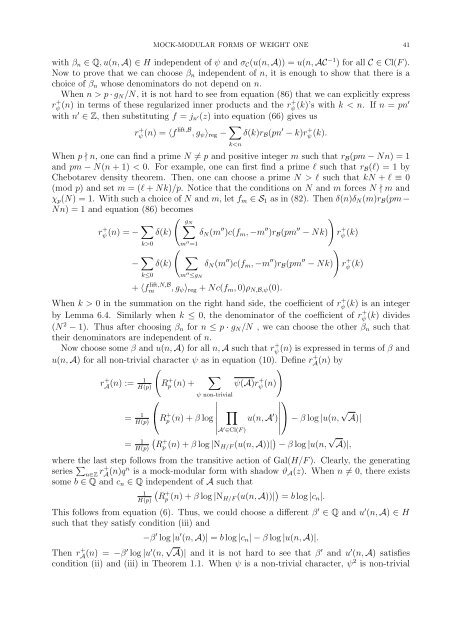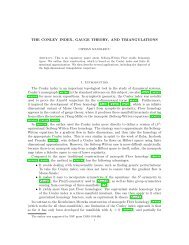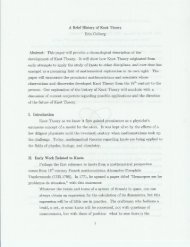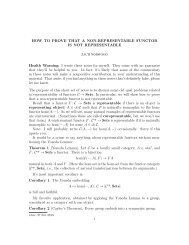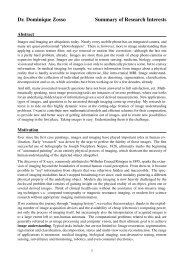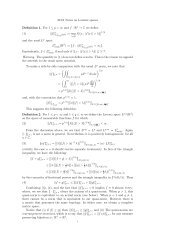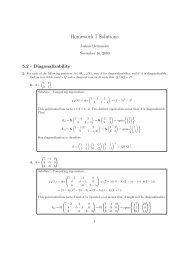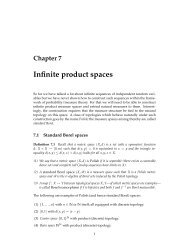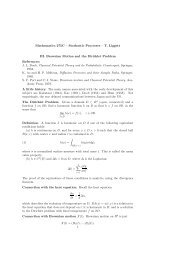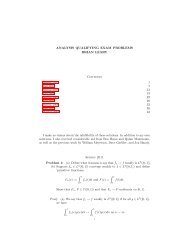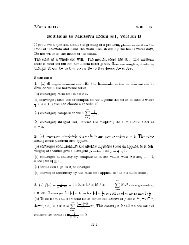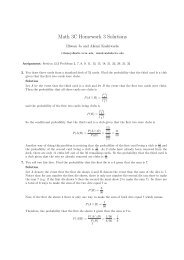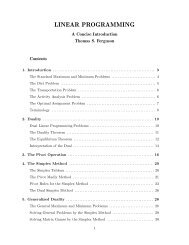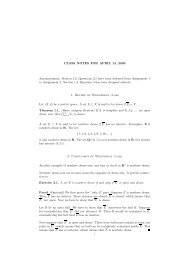Mock-modular forms of weight one - UCLA Department of Mathematics
Mock-modular forms of weight one - UCLA Department of Mathematics
Mock-modular forms of weight one - UCLA Department of Mathematics
Create successful ePaper yourself
Turn your PDF publications into a flip-book with our unique Google optimized e-Paper software.
MOCK-MODULAR FORMS OF WEIGHT ONE 41<br />
with β n ∈ Q, u(n, A) ∈ H independent <strong>of</strong> ψ and σ C (u(n, A)) = u(n, AC −1 ) for all C ∈ Cl(F ).<br />
Now to prove that we can choose β n independent <strong>of</strong> n, it is enough to show that there is a<br />
choice <strong>of</strong> β n whose denominators do not depend on n.<br />
When n > p · g N /N, it is not hard to see from equation (86) that we can explicitly express<br />
r + ψ (n) in terms <strong>of</strong> these regularized inner products and the r+ ψ<br />
(k)’s with k < n. If n = pn′<br />
with n ′ ∈ Z, then substituting f = j n ′(z) into equation (66) gives us<br />
r + ψ (n) = 〈f lift,B , g ψ 〉 reg − ∑ k l such that kN + l ≡ 0<br />
(mod p) and set m = (l + Nk)/p. Notice that the conditions on N and m forces N ∤ m and<br />
χ p (N) = 1. With such a choice <strong>of</strong> N and m, let f m ∈ S 1 as in (82). Then δ(n)δ N (m)r B (pm −<br />
Nn) = 1 and equation (86) becomes<br />
r + ψ (n) = − ∑ (<br />
gN<br />
)<br />
∑<br />
δ(k) δ N (m ′′ )c(f m , −m ′′ )r B (pm ′′ − Nk) r + ψ (k)<br />
k>0 m ′′ =1<br />
− ∑ ( )<br />
∑<br />
δ(k) δ N (m ′′ )c(f m , −m ′′ )r B (pm ′′ − Nk) r + ψ (k)<br />
k≤0 m ′′ ≤g N<br />
+ 〈f lift,N,B<br />
m , g ψ 〉 reg + Nc(f m , 0)ρ N,B,ψ (0).<br />
When k > 0 in the summation on the right hand side, the coefficient <strong>of</strong> r + ψ<br />
(k) is an integer<br />
by Lemma 6.4. Similarly when k ≤ 0, the denominator <strong>of</strong> the coefficient <strong>of</strong> r + ψ<br />
(k) divides<br />
(N 2 − 1). Thus after choosing β n for n ≤ p · g N /N , we can choose the other β n such that<br />
their denominators are independent <strong>of</strong> n.<br />
Now choose some β and u(n, A) for all n, A such that r + ψ<br />
(n) is expressed in terms <strong>of</strong> β and<br />
u(n, A) for all non-trivial character ψ as in equation (10). Define r + A<br />
(n) by<br />
(<br />
r + 1<br />
A<br />
(n) := R + H(p) p (n) +<br />
∑<br />
)<br />
ψ(A)r + ψ (n)<br />
= 1<br />
H(p)<br />
= 1<br />
H(p)<br />
ψ non-trivial<br />
⎛<br />
⎞<br />
∏<br />
⎝R p + (n) + β log<br />
u(n, A ′ )<br />
⎠ − β log |u(n, √ A)|<br />
∣A ′ ∈Cl(F ) ∣<br />
(<br />
R<br />
+<br />
p (n) + β log |N H/F (u(n, A))| ) − β log |u(n, √ A)|,<br />
where the last step follows from the transitive action <strong>of</strong> Gal(H/F ). Clearly, the generating<br />
series ∑ n∈Z r+ A (n)qn is a mock-<strong>modular</strong> form with shadow ϑ A (z). When n ≠ 0, there exists<br />
some b ∈ Q and c n ∈ Q independent <strong>of</strong> A such that<br />
1<br />
H(p)<br />
(<br />
R<br />
+<br />
p (n) + β log |N H/F (u(n, A))| ) = b log |c n |.<br />
This follows from equation (6). Thus, we could choose a different β ′ ∈ Q and u ′ (n, A) ∈ H<br />
such that they satisfy condition (iii) and<br />
−β ′ log |u ′ (n, A)| = b log |c n | − β log |u(n, A)|.<br />
Then r + A (n) = −β′ log |u ′ (n, √ A)| and it is not hard to see that β ′ and u ′ (n, A) satisfies<br />
condition (ii) and (iii) in Theorem 1.1. When ψ is a non-trivial character, ψ 2 is non-trivial


